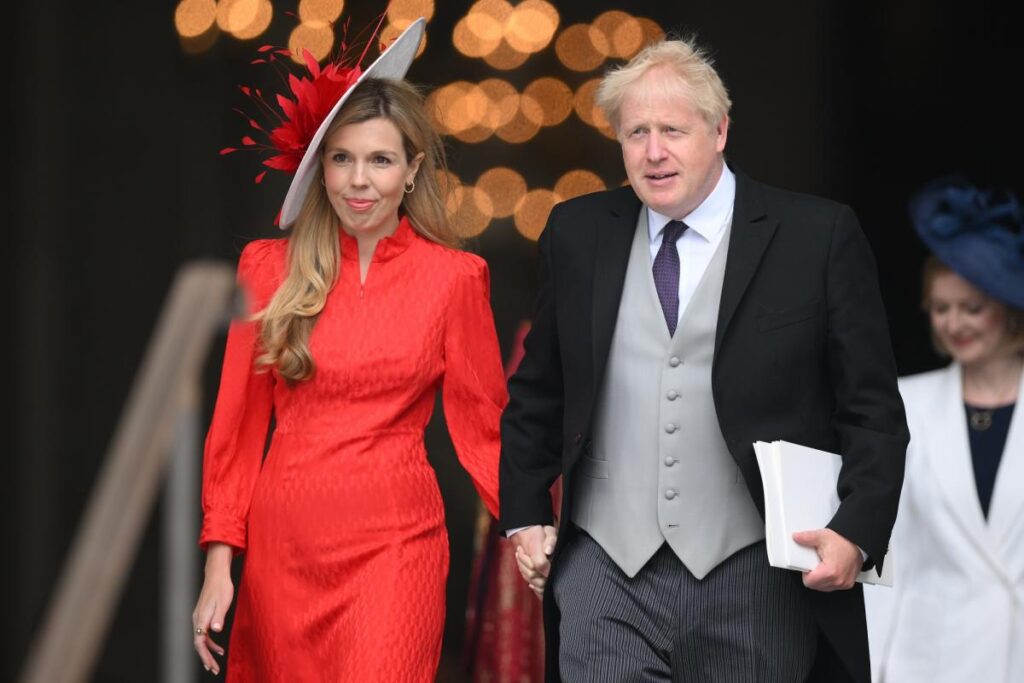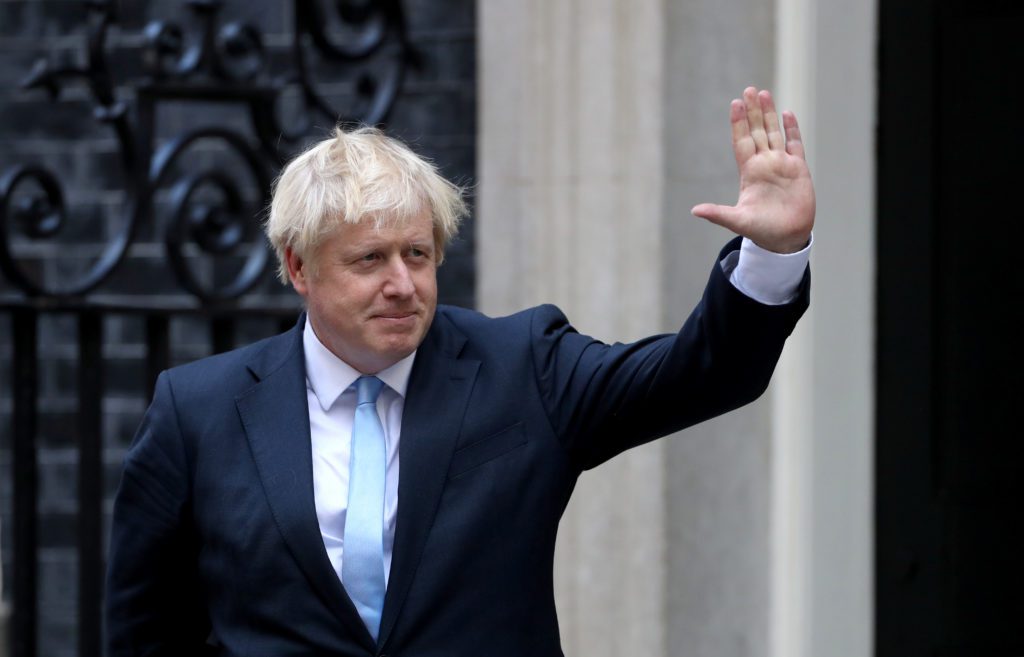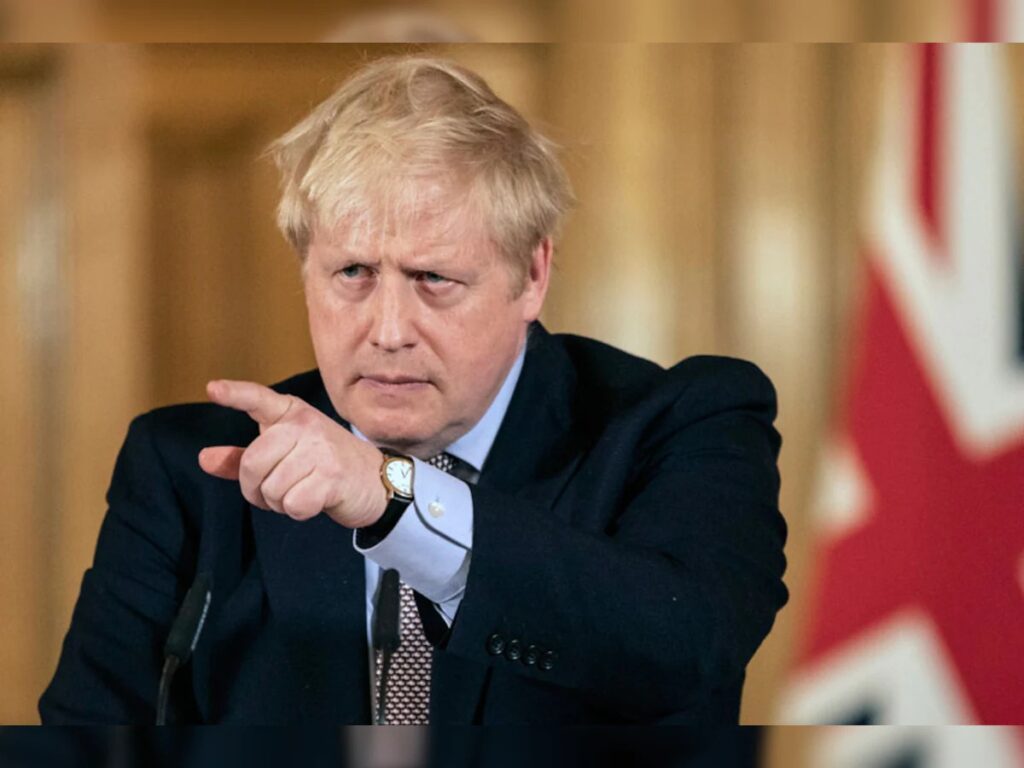Boris Johnson Biceps Height Weight Age Wiki Net Worth, Affairs, Marriage, Wife, Children, Family Biography & much more. Alexander Boris de Pfeffel Johnson (born 19 June 1964) is a British politician who has served as Prime Minister of the United Kingdom since 2019 and served as Leader of the Conservative Party from 2019 to 2022. He was Secretary of State for Foreign and Commonwealth Affairs from 2016 to 2018 and Mayor of London from 2008 to 2016. Johnson has been Member of Parliament (MP) for Uxbridge and South Ruislip since 2015 and was previously MP for Henley from 2001 to 2008.
Johnson attended Eton College and read Classics at Balliol College, Oxford. He was elected president of the Oxford Union in 1986. In 1989, he became the Brussels correspondent, and later political columnist, for The Daily Telegraph, and was editor of The Spectator magazine from 1999 to 2005. After being elected to Parliament in 2001, Johnson was a shadow minister under Conservative leaders Michael Howard and David Cameron. In 2008, he was elected mayor of London and resigned from the House of Commons; he was re-elected as mayor in 2012. In the 2015 election, Johnson was elected MP for Uxbridge and South Ruislip. The following year, he did not seek re-election as mayor. He became a prominent figure in the successful Vote Leave campaign for Brexit in the 2016 European Union (EU) membership referendum. Theresa May appointed him foreign secretary after the referendum; he resigned the position two years later in protest to May’s Chequers Agreement.
In 2019, Johnson was elected Conservative leader and appointed prime minister, He re-opened Brexit negotiations and in early September controversially prorogued Parliament; the Supreme Court ruled the action unlawful later that month. After agreeing to a revised Brexit withdrawal agreement with the EU, which replaced the Irish backstop with a new Northern Ireland Protocol, but failing to win parliamentary support for the agreement, Johnson called a snap election for December 2019 in which he led the Conservative Party to victory with 43.6 per cent of the vote, and the party’s largest seat share since 1987. On 31 January 2020, the United Kingdom withdrew from the EU, entering into a transition period and trade negotiations leading to the EU–UK Trade and Cooperation Agreement. The COVID-19 pandemic became a major issue of his premiership; the government responded with various emergency powers, introduced measures across society to mitigate its impact, and approved the rollout of a nationwide vaccination programme. Johnson has been criticised by some scientists for his slow response to the outbreak, including his resistance to introducing lockdown measures.
Numerous controversies have occurred during Johnson’s premiership, including the COVID-19 lockdown trip of his adviser Dominic Cummings, a dispute over a refurbishment of Downing Street, accusations of cronyism involving contracts and lobbying during the pandemic, and Johnson’s actions in scandals involving Owen Paterson and Chris Pincher. Amidst a wider controversy over government social gatherings, known as “Partygate”, he became the first British prime minister to have been sanctioned for breaking the law while in office after receiving a fixed penalty notice for breaching COVID-19 regulations. The publishing of the Sue Gray report, and a widespread sense of dissatisfaction, led to a confidence vote in his leadership among Conservative MPs in June 2022 which he narrowly survived. The Chris Pincher scandal in July 2022 led to the largest number of ministerial resignations in a 24-hour period, triggered by the resignations of Rishi Sunak and Sajid Javid from the cabinet, leading to his decision to resign the party leadership pending a leadership election.

Johnson is a controversial figure in British politics. Supporters have praised him as humorous, witty and entertaining, with an appeal stretching beyond traditional Conservative voters. Conversely his critics have accused him of lying, elitism, cronyism, bigotry, and amorality. Johnson’s political positions generally follow one-nation conservatism, and commentators have described his political style as opportunistic, populist, and pragmatic.
Early life
Alexander Boris de Pfeffel Johnson was born on 19 June 1964 on the Upper East Side of Manhattan, New York City, to 23-year-old Stanley Johnson, then studying economics at Columbia University, and 22-year-old Charlotte Fawcett, an artist from a family of liberal intellectuals. Johnson’s parents had married in 1963 before moving to the US. In September 1964, they returned to their native England, so that Charlotte could study at the University of Oxford; during this time, she lived with her son in Summertown, a suburb of Oxford, and in 1965 she gave birth to a daughter, Rachel. In July 1965, the family moved to Crouch End in north London, and in February 1966 they relocated to Washington, D.C., where Stanley had gained employment with the World Bank. Stanley then took a job with a policy panel on population control, and moved the family to Norwalk, Connecticut, in June. A third child, Leo, was born in September 1967.
In 1969, the family returned to England and settled into West Nethercote Farm, near Winsford in Somerset, Stanley’s remote family home on Exmoor in the West Country. There, Johnson gained his first experiences of fox hunting. His father was regularly absent from Nethercote, leaving Johnson to be raised largely by his mother, assisted by au pairs. As a child, Johnson was quiet and studious and was deaf, resulting in several operations to insert grommets into his ears. He and his siblings were encouraged to engage in highbrow activities from a young age, with high achievement being greatly valued; Johnson’s earliest recorded ambition was to be “world king”. Having few or no friends other than their siblings, the children became very close.
In late 1969, the family moved to Maida Vale in West London, while Stanley began post-graduate research at the London School of Economics. In 1970, Charlotte and the children briefly returned to Nethercote, where Johnson attended Winsford Village School, before returning to London to settle in Primrose Hill, where they were educated at Primrose Hill Primary School. A fourth child and third son, Joseph, was born in late 1971.
After Stanley secured employment at the European Commission, he moved his family in April 1973 to Uccle, Brussels, where Johnson attended the European School, Brussels I and learnt to speak French. Charlotte had a nervous breakdown and was hospitalised with clinical depression, after which Johnson and his siblings were sent back to England in 1975 to attend Ashdown House, a preparatory boarding school in East Sussex. There, he developed a love of rugby and excelled at Ancient Greek and Latin, but the teachers’ use of corporal punishment appalled him. Meanwhile, in December 1978 his parents’ relationship broke down; they divorced in 1980, and Charlotte moved into a flat in Notting Hill, West London, where her children joined her for much of their time.
Personal life
Since Johnson was born in New York City to British parents, he first held British-American dual citizenship. In 2014, he acknowledged he was disputing a demand for capital gains tax from the US tax authorities on a property that he inherited in the United Kingdom, which ultimately he paid. In February 2015, he announced his intention to renounce his US citizenship to demonstrate his loyalty to the UK, which he did in 2016. Johnson has a knowledge of French, Italian, German, Spanish, Latin, and Ancient Greek, frequently employing and alluding to classical references in both his newspaper columns and his speeches. His favourite film is The Godfather, due to “the multiple retribution killings at the end”.
Purnell wrote that Johnson was a “highly evasive figure” when it came to his personal life, who remained detached from others and who had very few if any intimate friends. Among friends and family, Johnson is more commonly known as Al (short for his forename Alexander), rather than his middle name Boris.
In 2007, Johnson said he had smoked cannabis before he went to university. He has also said he had used cocaine. Johnson partakes in cycling, tennis and pilates, and was formerly an avid runner before having to give it up due to knee issues. Johnson’s weight has fluctuated throughout his career; he was considered obese in 2018 and overweight in 2020, and has spoken of making efforts to lose weight.
Johnson owns a £1.3 million buy-to-let townhouse in Camberwell, South London. According to HM Land Registry documents he bought the four-bedroom property with his wife in July 2019. The register of MPs’ interests states that Johnson has a rental income of at least £10,000 a year.
Boris Johnson Resignation Politics Power Height Weight Age Wife Children Family Biography


Brexit policy
In his first speech as PM, Johnson said that the United Kingdom would leave the European Union on 31 October 2019 with or without a deal, and promised to remove the Irish backstop from the Brexit withdrawal agreement. Johnson declared his intention to re-open negotiations on the withdrawal agreement, but talks did not immediately resume as the EU refused to accept Johnson’s pre-condition that the backstop be removed. The government subsequently announced £2.1bn of funding to prepare for a no-deal Brexit on 31 October. On 28 August 2019, UK and EU negotiators agreed to resume regular meetings to discuss the withdrawal agreement.
Also on 28 August 2019, Johnson declared he had asked the Queen to prorogue parliament from 10 September, narrowing the window in which parliament could block a no-deal Brexit and causing a political controversy. The Queen at Privy Council approved prorogation later the same day, and it began on 10 September, scheduled to last until 14 October. Some suggested that this prorogation amounted to a self-coup, and on 31 August 2019, protests occurred in towns and cities throughout the United Kingdom. As of 2 September 2019, three separate court cases challenging Johnson’s action were in progress or scheduled to take place, and on 11 September, three Scottish judges ruled the prorogation of the UK Parliament to be unlawful. On 12 September, Johnson denied lying to the Queen over suspension of the parliament, while a Belfast Court rejected claims that his Brexit plans will have a negative impact on Northern Ireland’s peace policy. On 24 September, the Supreme Court ruled unanimously that Johnson’s advice to prorogue parliament was unlawful, and therefore the prorogation was rendered null and of no effect.
When parliament resumed on 3 September 2019, Johnson indicated he would call a general election under the Fixed-term Parliaments Act after opposition and rebel Conservative MPs successfully voted against the government to take control of the order of business to prevent a no-deal exit. Despite government opposition, the Benn Act, a bill to block a no-deal exit, passed the Commons on 4 September 2019, causing Johnson to propose a general election on 15 October. His motion was unsuccessful as it failed to command the support of two-thirds of the House.
In October 2019, following bilateral talks between Johnson and Taoiseach Leo Varadkar, the UK and EU agreed to a revised deal, which replaced the backstop with a new Northern Ireland Protocol.
In December 2019, Johnson said: “quite a large number of people coming in from the whole of the EU—580 million population—[had been] able to treat the UK as though it’s basically part of their own country and the problem with that is there has been no control at all”. The co-founder of The 3 Million accused Johnson of “demonising” EU migrants.
Partygate scandal
In early December 2021, reports emerged that social gatherings of government and Conservative Party staff in Downing street had taken place ahead of Christmas 2020 against COVID regulations. Johnson and a spokesperson denied these allegations. Following a leaked video showing Downing Street staff joking about a “fictional party”, at a press conference rehearsal recorded days after one alleged party took place, Johnson apologised for the contents of the video and suggested he had been misled but had now ordered an inquiry into whether a party took place and whether rules were broken.
On 10 January 2022, ITV News reported that a planned party had taken place on 20 May 2020, during the first lockdown. ITV had obtained an email sent by principal private secretary Martin Reynolds to staff inviting them to “socially distanced drinks” in the garden of No. 10 and asking them to “bring your own booze”. At the time, people outdoors were not allowed to meet more than one person from outside their household. Two eyewitnesses later alleged that Johnson and Symonds attended, contradicting Johnson’s insistence in December 2021 that there were “no parties”. At first, Johnson did not deny that he attended.
On 12 January 2022, Johnson apologised to MPs in the Commons for “attending an event in the Downing Street garden during the first lockdown”, stating he believed it was “a work event”. He said that MPs should await the outcome of the independent inquiry into Westminster lockdown parties, led by senior civil servant Sue Gray, which he said “will report as soon as possible”. There were immediate calls across the House for Johnson to resign, voiced mainly by the leaders of the opposition parties. Later, Scottish Conservative leader Douglas Ross and several other Conservative MPs expressed their agreement.
On 19 January, Bury South MP Christian Wakeford defected from the Conservative Party to the Labour Party. At the end of Prime Minister’s Questions, Conservative former minister David Davis called for Johnson to resign, quoting Leo Amery calling on Neville Chamberlain to resign during the Norway Debate in 1940, and saying: “You have sat there too long for all the good you have done. In the name of God, go.” Amery’s call was itself a reference to Cromwell’s dismissal of the Rump parliament.
On 25 January, the Metropolitan Police’s chief commander, Cressida Dick, announced that they were commencing investigations into the Downing Street Parties. Dick stated that “potential breaches of Covid-19 regulations” at Downing Street and Whitehall over the last two years would be looked into.
An abbreviated version of the Sue Gray report into the controversy was released on 31 January, where Gray concluded there was a “failure of leadership” over the events that she had examined. The release of the full report was delayed pending the Metropolitan Police’s investigation.
In early February 2022, four of Johnson’s senior aides resigned: Dan Rosenfield (chief of staff), Martin Reynolds (principal private secretary), Munira Mirza (head of policy) and Jack Doyle (director of communications).
On 12 April 2022, Downing Street confirmed that Johnson would be issued a fixed penalty notice for £50 as police believed he had broken the law by breaching COVID-19 regulations when attending parties during COVID-19 restrictions. At least 50 such notices would be issued, with other recipients including Johnson’s wife and Chancellor Sunak. Johnson therefore became the first Prime Minister in British history to have been sanctioned for breaking the law while in office. Boris Johnson either knowingly broke the law or did not understand laws he himself had introduced.
According to Downing Street insiders, Johnson was involved in instigating a party on the occasion of Lee Cain leaving Number 10. What had begun as press office drinks became a party after Johnson arrived, gave a speech and poured drinks for staff. Labour’s deputy leader, Angela Rayner said, “If the latest reports are true, it would mean that not only did the prime minister attend parties, but he had a hand in instigating at least one of them. He has deliberately misled the British people at every turn. The prime minister has demeaned his office.”
On 19 April 2022 Commons Speaker Lindsay Hoyle decided that MPs would vote, on 21 April, on whether Johnson should be referred to the Parliamentary Privileges Committee to investigate whether he knowingly misled Parliament. This was waved through unopposed on 21 April.
Steve Baker said Johnson’s, “marvellous contrition… only lasted as long as it took to get out of the headmaster’s study”. Baker added, “I have to acknowledge that if the prime minister occupied any other office of senior responsibility… he would be long gone.”
In April 2022 a poll by, The Independent found 27% of voters who voted Conservative in the 2019 general election claim they are less likely vote that way again if Johnson stays leader. Labour were at 40% with the Conservatives at 34%. Johnson rated -28 (33% claim he does a good job and 61% bad) worse than -19 the previous month. About 65%, including 46% of Conservative voters maintained Johnson should resign if he gets more fixed penalty notices or gets severe criticism in Sue Gray’s report and 63% maintained his apologies were not good enough. Only 28% believed he did not know he was breaking the law during a Downing Street birthday party, while 63%, including 52% of Conservative voters, maintained he was lying. Leaflets for the May 2022 referred to candidates as Local Conservatives and avoided pictures of Johnson.
Following the May 2022 local elections in the UK many leading Conservatives in areas where the Conservatives had done badly were blaming Johnson and calling on Johnson to resign.
On 1 June Lord Geidt said he wanted Johnson to explain why he thought his fixed penalty notice did not show he had broken the ministerial code.
On 6 June Graham Brady announced that the threshold for a vote on Johnson’s leadership had been passed; the vote was scheduled for later that same day.

Lying
Johnson has been accused of lying or making untruthful or misleading statements throughout his career. BBC News described this as a strategy to “bamboozle the listener with a blizzard of verbiage”, and a 2021 analysis in The Atlantic suggested Johnson’s communication style was a honed political skill that contributed to his popularity. In 2019, The Independent listed his “most notorious untruths”, which included fabricating a quote whilst at The Times for which he was sacked, creating euromyths while working for The Daily Telegraph in Brussels, misrepresenting events during the Hillsborough disaster while the editor of The Spectator, lying to Michael Howard about his extramarital affair and promising that leaving the EU would provide £350 million per week for the NHS. The Guardian noted that Johnson “almost never corrects the record in the chamber” and that while Johnson’s spokespeople insist he follows the Ministerial Code, which annexes the Nolan Principles recommending that “Holders of public office should be truthful”, 10 Downing Street “will sometimes acknowledge that an error was made, but more usually brushes aside the complaint or argues that Johnson was misunderstood”.
Writing in the Times Literary Supplement, the scholar and former politician Rory Stewart observed that Johnson is “the most accomplished liar in public life. Perhaps the best liar ever to serve as prime minister. He has mastered the use of error, omission, exaggeration, diminution, equivocation and flat denial. He has perfected casuistry, circumlocution, false equivalence and false analogy. He is equally adept at the ironic jest, the fib and the grand lie; the weasel word and half-truth; the hyperbolic lie, the obvious lie and the bullshit lie.” In 2021, the political journalist and author Peter Oborne published a book about the lies told by Johnson, in which he wrote “I have never encountered a senior British politician who lies and fabricates so regularly, so shamelessly and so systematically as Boris Johnson”. Opposition MPs Dawn Butler and Ian Blackford have both openly called Johnson a liar in the House of Commons.] Laura Kuenssberg, political editor for BBC News, noted that it was “rare for opposition parties to accuse a prime minister, on the record, of lying”. In January 2022, Labour leader Keir Starmer accused Johnson of lying about a Downing Street party during lockdown in May 2020. Speaking in the Commons on 31 January 2022, Johnson made a false accusation against Starmer about not prosecuting the serial sex offender Jimmy Savile when Starmer was Director of Public Prosecutions.
In April 2022 a poll by JLPartners found voters most frequently described the prime minister as a, ‘liar’ followed by, ‘incompetent’ and, ‘untrustworthy’. Only 16% of respondents described Johnson with positive language while over 70% used negative language.
